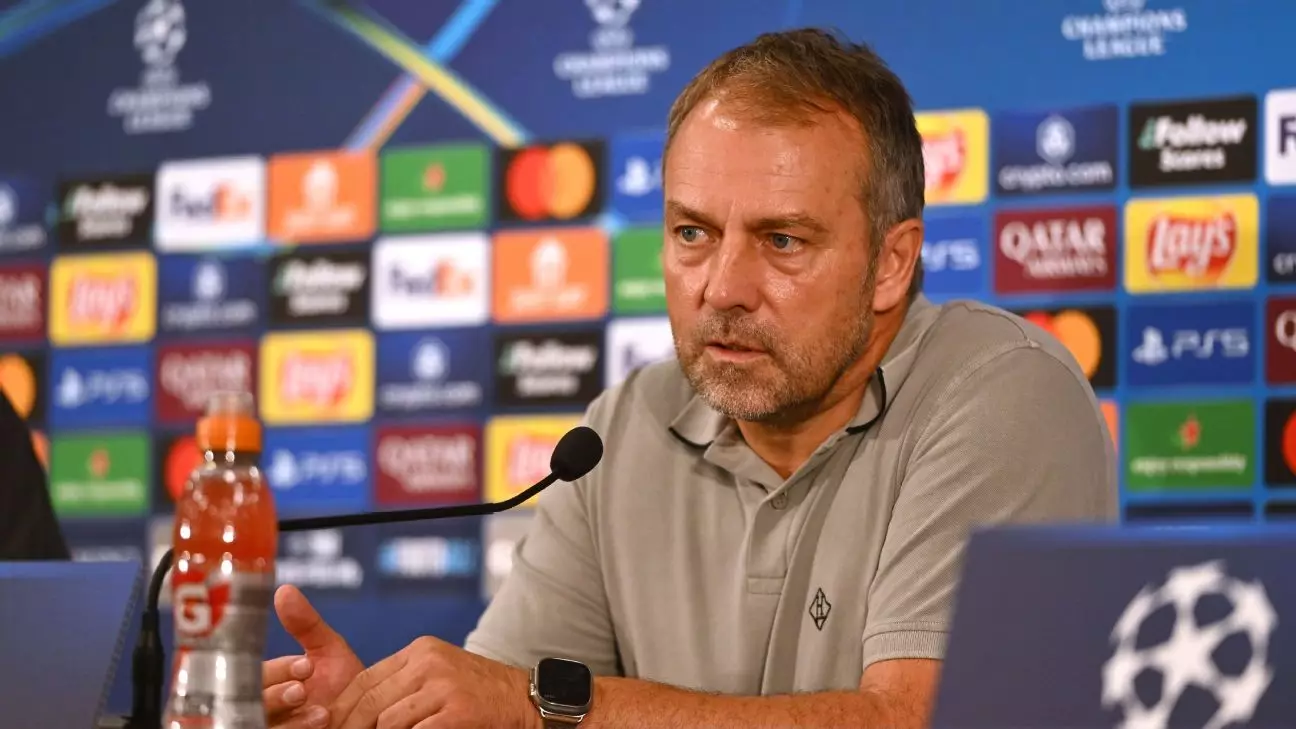Barcelona, under the guidance of Hansi Flick, has begun the season with a strong start that has many supporters buzzing with optimism. However, as the dust settles on their recent misstep against Monaco in the Champions League, the complexities of balancing a congested fixture list and mounting injuries become increasingly apparent. Flick, who emphasized the importance of resilience in the face of adversity, faces a diverse set of challenges that could test the mettle of his squad.
In recent years, the global footballing community has been vocal about the overwhelming demands placed on players, with many—like Manchester City’s Rodri—suggesting that a strike may be on the horizon if conditions do not improve. The congestion in the football calendar is no small issue; it hampers performance and can lead to injuries, as seen in Barcelona’s current situation. The pressure is relentless, and while Flick refuses to offer excuses, he is among the rising chorus calling for change from governing bodies like UEFA and FIFA.
Barcelona’s roster is currently riddled with injuries, including significant absences like Ronald Araújo and Frenkie de Jong, which only amplifies the pressure on the remaining squad members. Flick remains focused on the available players, often emphasizing the next match and the importance of substituting tired legs with fresh energy. His commitment to maintaining high standards is commendable, but the reality of limited depth cast doubts on the team’s long-term sustainability through this grueling schedule.
As he prepares for the upcoming league match against an unbeaten Villarreal side, the depth and quality of his squad are put under the microscope. The loss to Monaco has not only disrupted their European campaign but also impacted player confidence. It’s easy to wonder if Flick’s steadfast mentality can truly shoulder the burden of sustaining performance amidst such physical strain.
Flick’s claims are just one half of the larger narrative surrounding player welfare in football today. As demands for sharp performances rise, the quality of matches may inevitably plummet without adequate rest periods for these elite athletes. Flick’s assertion that UEFA and FIFA need to reevaluate their scheduling priorities rings true; the well-being of players should take precedence over financial interests tied to extended match calendars.
Excessive bloat in the schedule is not just a challenge for Barcelona. Other clubs face similar predicaments, creating a domino effect on performance across leagues. For players, the experience is often a double-edged sword: the love for the game clashes with the physical toll it entails. The call for reform may be a litmus test for how seriously these governing bodies prioritize athlete welfare in a sport that often seems to value profit over well-being.
The next match against Villarreal presents a daunting task, especially with the added pressure of injury-stricken players and tactical adjustments necessary to mitigate the absence of key figures like Ferran Torres. Flick will need to instill confidence in his players while also maintaining discipline and resilience on the pitch. The formidable nature of Villarreal, who are also searching for victories, offers a compelling matchup that will push both teams to their limits.
Despite the pressures, there is a glimmer of hope within the squad. Young talents stepping up to the plate can bolster Barcelona’s efforts, and Flick’s emphasis on teamwork and player cohesion could earn dividends in the form of unexpected performances. The fluidity and understanding of play among Barcelona’s players will be essential in overcoming a tough opponent, as the manager believes everyone should know their roles down to the minutest details.
In the aftermath of the loss against Monaco, questions arose about Marc-André ter Stegen’s capabilities. Flick, however, defended his goalkeeper, emphasizing that mistakes are an intrinsic part of being human—especially in such a high-stakes environment. The goalkeeping position is often scrutinized to an intense degree, but ter Stegen’s skills in ball distribution should not be overshadowed by isolated errors. Flick’s belief in his goalkeeper’s ability to possess and distribute the ball aligns with the modern playstyle, and trusting him to bounce back will be vital moving forward.
As Barcelona embarks on a new chapter under Flick, the echoes of last season’s successes may just serve as motivation to push through challenges this season. With a hefty fixture schedule, an unbalanced squad, and lofty expectations, maintaining focus while nurturing the collective spirit may be the key to navigating both domestic and European waters. The future of Barcelona hinges on their ability to adapt and reshape their approach; only time will reveal if they can rise to the occasion.
